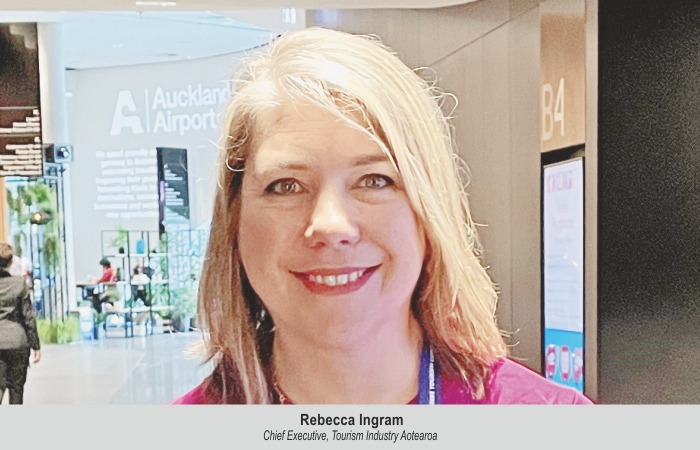The tourism industry in New Zealand has faced unprecedented challenges and as the country seeks to rebuild and redefine its tourism sector, industry leaders gathered at the TRENZ 2023 to discuss the path forward. Rebecca Ingram, Chief Executive, Tourism Industry Aotearoa, highlights key aspects of the industry’s future direction.
TT Bureau
While New Zealand looks at a comprehensive plan to navigate the future of tourism, currently, international visitor arrivals, though recovering, are sitting at around 66 per cent of the pre-COVID levels. Holiday arrivals constituted only 40 per cent of pre-pandemic figures.
“The initial revenge travel surge has subsided, making it crucial to compete for high-quality visitors. However, New Zealand’s spending indicators remained positive, with domestic spending holding strong, indicating a continued appreciation of the country’s offerings by the local population,” says Rebecca Ingram, Chief Executive, Tourism Industry Aotearoa.
Ingram highlighted that tourism recovery was not homogeneous, with different regions and businesses experiencing varying levels of recovery.
While some regions had a successful summer, workforce recovery remained a challenge. To overcome this, the future of tourism needs to focus on regenerative tourism, says Ingram. “The DNA of the industry had been forever changed due to COVID-19, presenting an opportunity for regenerative tourism with a net positive impact. New Zealand’s unique position allowed for the creation of next-generation tourism experiences that met the changing demands of consumers and the evolving expectations of New Zealanders,” she adds.
“Various initiatives were undertaken to ensure that the New Zealand tourism experience was one to be proud of. Legislative changes, community-led destination management plans, and sustainability measures had been implemented in recent years. Destination management plans played a significant role in shaping regional tourism offerings and capturing community wishes. The Aroha of Tourism campaign aimed to highlight the positive impact of tourism on communities and celebrate remarkable tourism operators benefiting New Zealand at various levels,” she further adds.
New Zealand recognizes the critical role of events like TRENZ in connecting the tourism industry with overseas buyers and showcasing New Zealand’s offerings.
“By bringing buyers and sellers together, TRENZ facilitated the creation of partnerships and deals that contributed to the wider economy, the host communities, and the families reliant on the tourism sector. TRENZ 2023 would build momentum for a stronger future for New Zealand tourism,” informed Ingram.
New Zealand is working on a comprehensive industry strategy that reflected the significant shifts brought about by the pandemic and outlines key strategic issues, including reducing tourism’s carbon footprint, supporting industry prosperity, embedding Maori perspectives, and enhancing innovation and technology. “The development of a vision for the industry has been highlighted as a crucial step. The vision of enriching Aotearoa New Zealand through a flourishing tourism ecosystem set the stage for pursuing outcomes that supported productive businesses, protected the environment, enhanced local communities, and delivered outstanding visitor experiences,” concludes Ingram.
 TravTalk India Online Magazine
TravTalk India Online Magazine





